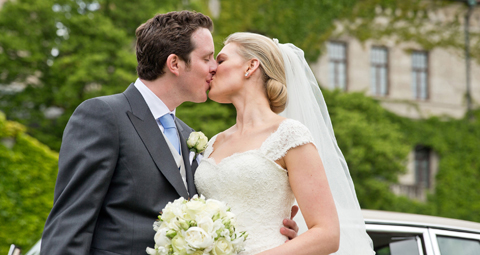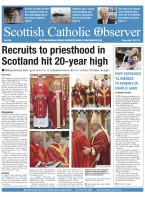April 13 | ![]() 0 COMMENTS
0 COMMENTS ![]() print
print

Pope Francis’ ‘The Joy of Love’ has sparked a battle over its interpretation
— In the first part of a series on Amoris Laetitia and questions around the admission of the divorced and remarried to the Sacraments, leading canon lawyer Mgr Peter Magee outlines three approaches taken to the apostolic exhortation and looks for answers in the Holy Father’s letter to Argentinian bishops
ON April 8, 2016, Pope Francis published an important document on love in the family called Amoris Laetitia (AL), or ‘The Joy of Love.’ He wrote the document after two meetings of the Synod of Bishops in Rome in 2014 and 2015.
A synod is a meeting of bishops with the Pope to offer him their advice on matters of Faith, morality or discipline. For the synods in 2014-15, the Pope had chosen the theme of the family.
AL contains a great deal of wisdom, truth and practical advice. In many parts, it is very poetic and profound. In others, it deals with the many challenges faced today by Christian families and how the Church, especially through her pastors, is called to assist them. It offers especially many practical suggestions for assisting couples preparing to marry and already married.
At the same time, a few paragraphs of AL, in its chapter eight, have caused some strong and frank disagreements within the community of the worldwide Church, and at all levels.
The main point in dispute concerns the admission to the sacraments of Reconciliation and Eucharist of those who have divorced and attempted a second marriage and are living in a sexual relationship as if husband and wife.
The divorce and attempted marriage will have been pursued under civil law without those concerned having obtained a declaration of the nullity of their first marriage by a Church tribunal.
Until AL, those who divorce and relate to another person as if that other person were their true spouse (whether civilly remarried or not), have been prohibited without exception by the Church from receiving the sacraments. The ‘make or break’ point here is the sexual relationship. The Church teaches that God intended sexual relations to find their true meaning only within a true marriage. A true marriage means a valid exchange of consent between a man and a woman which is exclusive and permanent and which is aimed at generating new life in the gift of children and deeper life between the spouses.
To have sex in any form outside of marriage has been taught by the Church from the beginning to be a serious sin against marriage, and thus against God, because it is contrary to the plan of the Creator. Hence the sixth commandment: “Thou shalt not commit adultery.”
Adultery is the classic form of this sin, but it covers all forms of sexual activity outside of marriage. The debate which has followed the Holy Father’s teaching in chapter eight of AL could be said to reveal three main approaches to the Pope’s words.
The first is that the divorced who are in a new sexual relationship can receive the Sacraments when certain carefully considered circumstances of conscience are in place. Those who take this approach to the Pope’s teaching also state that, in opening the door to the sacraments for these members of the Church, the Holy Father is changing nothing of the teaching of the Church.
They say that he is merely developing it in a way more in tune with the complexity of people’s individual situations. They say that Pope Francis wants us not just to consider the rule prohibiting the sacraments but also the state of mind and conscience of the individual person in his or her actual situation.
Perhaps this approach could be summed up this way: AL introduces no change of doctrine, but only a change of discipline.
The second approach says that the Pope cannot possibly mean that the divorced in a new sexual relationship can have access to the Sacraments. This would represent a major break with the teaching of Christ himself and with the way it has always been interpreted and applied by the Church in her tradition and discipline.
Those who adopt this second approach, therefore, say that AL can only be understood in continuity with the tradition and discipline of the Church from the beginning.
Since that has always prohibited the divorced in a new sexual relationship, whatever their circumstances, from access to the Sacraments (apart from danger of death), the Pope cannot possibly have intended to change it.
Indeed, he does not have the authority to do so because it would run counter not just to the teaching of the Church but to the words of Christ in which that teaching is rooted.
Perhaps this second approach can be summed up as follows: AL introduces neither a change of doctrine nor a change of discipline.
The third approach says that the Pope’s words in chapter eight of AL do appear in fact to break with both traditional doctrine and discipline. It also agrees with the second approach in saying that the Pope does not have the authority to make this break. Some who take this third approach believe that the Pope must clarify outright whether he intends to change the doctrine and discipline of the Church in this matter. The clarification is needed because the first two approaches give opposite interpretations to the same paragraphs of AL.
It is required especially because we are dealing with something too important for salvation, for the peace of soul and of conscience of so many.
This third approach could be described this way: AL seems to change both doctrine and discipline.
In the late summer of 2016, four cardinals who take this third approach wrote to the Pope asking him to clarify formally the meaning of this part of AL. They put to the Holy Father five doubts—the dubia—to which they believe his teaching had given rise and they invited him to resolve them.
The first of these was to ask if it was now permissible for a Catholic who is divorced and in a new sexual relationship to receive the Sacraments of Reconciliation and the Eucharist.
The other four doubts of the cardinals are more technical but all follow directly from the first one. One of them, for example, asks if a person’s conscience can create for itself an exception to moral norms which prohibit absolutely a given behavior, such as adultery. In other words, does ‘thou shall not committed adultery’ hold always and everywhere despite the circumstances?
To date, as far as we know, the Holy Father has preferred not to respond to the four cardinals either directly or publicly. He has, however, written privately to the bishops of Buenos Aires in Argentina saying that ‘there are no other interpretations’ to be given to AL than the one those same bishops had given.
By saying this, the Pope openly endorsed their interpretation of chapter eight of AL. This endorsement represents an indirect—but probably unintended—response to the four cardinals, or at least to one or two of their questions, and at least to some degree.
So, how do the Bishops of Buenos Aires come into it?
After AL came out, the bishops drew up guidelines, dated September 5, 2016, for priests in Buenos Aires to help them put the disputed chapter eight of the document into practice in their parishes.
Number six of those guidelines reads: “If it comes to be recognised that, in a specific case, there are limitations that mitigate responsibility and culpability, especially when a person believes they would incur a subsequent wrong by harming the children of the new union, Amoris Laetitia offers the possibility of access to the sacraments of Reconciliation and Eucharist.
“These sacraments, in turn, dispose the person to continue maturing and growing with the power of grace.”
In an article in L’Osservatore Romano on September 12, 2106, it was confirmed that the Holy Father had written to the Buenos Aires bishops saying that their guidelines accurately explained what AL taught and captured its full meaning. “There are no other interpretations,” he said.
This clear approval by the Pope of those guidelines, including number six, seems then to have encouraged other individual bishops and groups of bishops around the world to issue their own guidelines in the same sense as those of the Buenos Aires bishops.
But there have also been other bishops and groups of bishops who, before and since, issued their own guidelines holding that the divorced and remarried living in a sexual relationship may not be admitted to the Sacraments.











